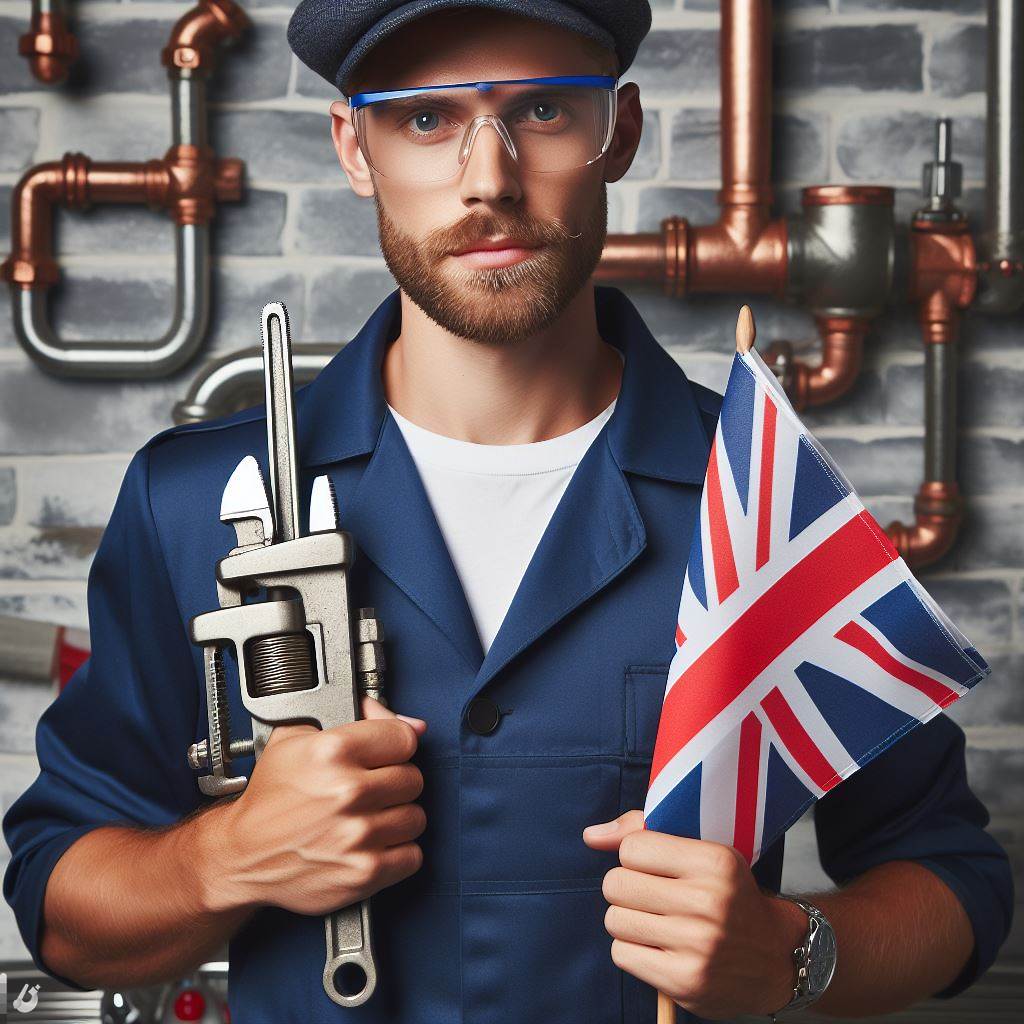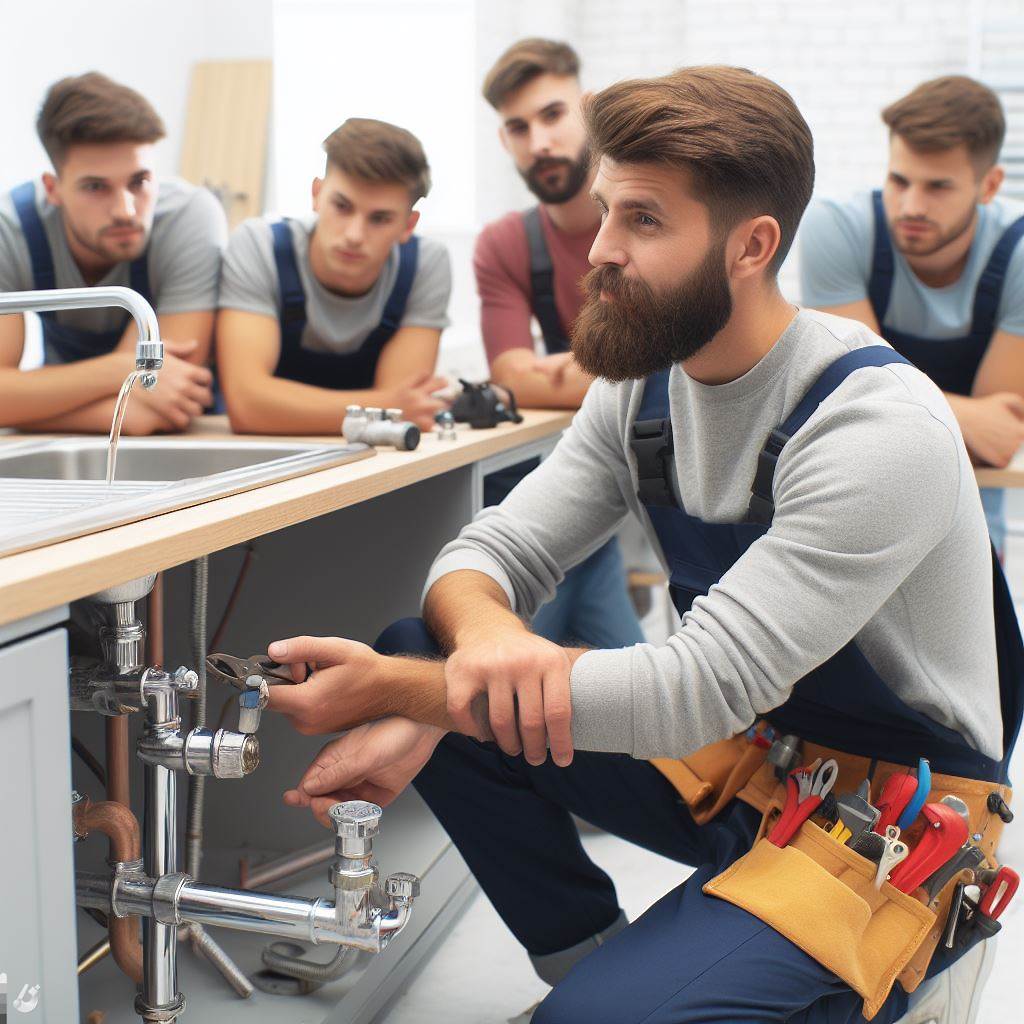Introduction
In the intricate web of the UK’s infrastructure, plumbing assumes a role of paramount importance.
Beyond the visible pipes and fixtures, plumbing is the backbone that ensures the nation’s water supply, sanitation, and heating systems function seamlessly.
This section delves into the significant realm of UK plumber training, shedding light on the vital skills and knowledge required for aspiring plumbers.
As we unravel the layers of this essential craft, we recognize that plumbing education plays a pivotal role in shaping competent professionals.
This blog post serves as a guide, providing aspiring plumbers with valuable insights into the dynamic landscape of training in the United Kingdom.
From understanding the foundational importance of plumbing in sustaining the nation’s infrastructure to navigating the intricacies of plumber training, this journey aims to equip individuals with the knowledge needed to excel in this essential and impactful field.
Whether you’re considering a career in plumbing or are already on the path of training, this section offers a comprehensive overview of what you need to know to thrive in the world of plumbing in the UK.
What is a Plumber?
A plumber is a professional who specializes in the installation, repair, and maintenance of plumbing systems.
Definition of a plumber
- A plumber is an individual trained to work with pipes, fixtures, and other plumbing materials.
- Their expertise lies in ensuring the proper functioning of water supply, drainage, and heating systems.
Explanation of the role and responsibilities of plumbers
- Plumbers are responsible for installing new plumbing systems in residential, commercial, and industrial buildings.
- They assess and interpret blueprints to determine the layout and design of plumbing systems.
- Plumbers also maintain and repair existing plumbing systems, such as fixing leaks or unclogging drains.
- They use a variety of tools and equipment to perform their job, including wrenches, pipe cutters, and soldering irons.
Importance of plumbing in various sectors (residential, commercial, industrial)
- In the residential sector, plumbers ensure a reliable supply of water for domestic use and efficient drainage systems.
- They install and repair fixtures like toilets, sinks, showers, and water heaters to maintain a comfortable living environment.
- In commercial buildings, plumbers play a vital role in maintaining the plumbing infrastructure for businesses.
- They ensure proper water supply and sewage disposal, which is necessary for the smooth operation of offices, restaurants, and shops.
- In the industrial sector, plumbers are essential for the functioning of manufacturing plants and industrial facilities.
- They oversee complex plumbing systems used for industrial processes, including specialized piping and machinery.
In summary, plumbers are highly skilled professionals who contribute significantly to the functionality and convenience of various sectors.
From residential homes to commercial establishments to industrial sites, their expertise in plumbing is crucial for maintaining essential systems.
Read: Balancing Work-Life as a UK Electrician
Becoming a Plumber in the UK
Becoming a plumber in the UK requires a combination of education, training, and practical experience.
Plumbers play a vital role in society by ensuring the smooth functioning of plumbing systems, which is essential for our everyday lives.
This section provides an insight into the education and training requirements, accreditation and licensing process, as well as the skills and qualities necessary for success in this field.
Education and training requirements
The journey to becoming a plumber starts with the acquisition of academic qualifications.
Personalized UK Career Consulting
Receive tailored career guidance designed just for you. Get actionable steps and expert support to boost your career in 1-3 days. Take control of your career now.
Get StartedHigh school education or its equivalent is typically required to pursue a career in plumbing.
Courses in mathematics, physics, and technical subjects can provide a solid foundation.
However, academic qualifications alone are not sufficient.
Vocational training programs offer specialized training in plumbing techniques, safety protocols, and industry regulations.
These programs equip individuals with the practical skills and knowledge needed to excel in the field.
Completing a vocational training program is highly recommended to enhance employability and gain a competitive edge.
Apprenticeships are another valuable pathway to becoming a plumber in the UK.
Apprentices work under the guidance of experienced professionals, gaining hands-on experience and practical knowledge.
This on-the-job training allows apprentices to apply their theoretical learning in real-world situations, preparing them for the challenges of the profession.
Accreditation and licensing
To ensure the competency and professionalism of plumbers, various registration bodies and associations exist in the UK.
These organizations set and maintain high standards for the industry.
Plumbers can join these associations to showcase their commitment to quality and stay updated with the latest developments in the field.
To practice as a professional plumber, individuals must obtain a plumbing license.
The process of obtaining a license involves specific steps outlined by the relevant authorities.
Your Dream Job Starts with a Perfect CV
Get a tailored CV and cover letter that captures your unique strengths and stands out in your industry. Let us help you make an unforgettable first impression.
Get StartedThese steps typically include completing the necessary education and training requirements, accumulating a certain number of practical hours, and passing licensing exams.
Each licensing jurisdiction may have its own requirements, so it is essential to research and adhere to the regulations of the specific area.
Skills and qualities required for success as a plumber
Being a successful plumber requires a range of skills and qualities beyond technical knowledge.
While technical skills are fundamental, plumbers must also possess problem-solving abilities.
Plumbing systems can be complex, and plumbers often encounter unique challenges that require analytical thinking and innovative solutions.
In addition to mental skills, physical stamina and dexterity are crucial for plumbers.
They must be able to carry out physically demanding tasks, work in cramped spaces, and have the agility to maneuver difficult environments.
Plumbers often work in challenging conditions and must adapt to different work sites, making physical fitness a necessity.
Therefore, starting a career as a plumber in the UK requires a combination of education, training, and practical experience.
By obtaining academic qualifications, completing vocational training programs, and pursuing apprenticeships, individuals can acquire the necessary skills and knowledge.
Accreditation and licensing are essential to showcase professionalism and meet industry standards.
Possessing technical skills, problem-solving abilities, and physical stamina will contribute to success in this rewarding profession.
Read: The Salary Range of UK Mechanics in 2024

Types of Plumber Training in the UK
Dedicated individuals who aspire to become plumbers in the UK have various training options to choose from.
Optimize Your LinkedIn for Success
Boost your LinkedIn profile with a professional bio, keyword-rich headline, and strategic recommendations that attract recruiters. Stand out from the crowd and get noticed.
Optimize NowTwo popular routes are vocational training programs and apprenticeships.
Vocational Training Programs
Exploring options for plumbing training courses
Individuals interested in pursuing a career in plumbing can choose from a wide range of training courses available throughout the UK.
These programs are specifically designed to provide in-depth knowledge and hands-on experience to aspiring plumbers.
Duration and cost considerations
When deciding on a vocational training program, prospective plumbers should evaluate the duration and cost of the course.
Some programs may span a few weeks or months, while others may take longer to complete.
It is important to weigh these factors against personal commitments and financial resources.
Curriculum and practical training components
Vocational training programs offer a comprehensive curriculum that covers various aspects of plumbing.
Students can expect to learn about pipework, drainage systems, heating systems, and safety regulations.
Additionally, these programs often include practical training sessions where students can apply their knowledge in real-life scenarios.
Apprenticeships
Benefits and drawbacks of apprenticeship programs
Apprenticeships provide individuals with a unique opportunity to learn on the job while earning a wage.
One of the key benefits of apprenticeships is gaining practical experience under the guidance of experienced plumbers.
However, apprenticeships may also require a longer commitment and may offer lower initial wages compared to vocational training programs.
How to find and apply for apprenticeship opportunities
To find apprenticeship opportunities, individuals can reach out to plumbing companies, trade organizations, or local plumbing associations.
Online job portals and government websites may also list apprenticeship vacancies.
It is essential to carefully review the requirements and application process before submitting an application.
Typical structure and duration of plumbing apprenticeships
Plumbing apprenticeships usually consist of a combination of on-the-job training and attending college or training centers.
This structure allows apprentices to gain practical experience and theoretical knowledge simultaneously.
The duration of the apprenticeship can vary but commonly lasts between two to four years, depending on the program.
Most importantly, individuals pursuing a career in plumbing in the UK can opt for either vocational training programs or apprenticeships.
Vocational training programs offer focused courses with flexibility in terms of duration and cost.
On the other hand, apprenticeships provide on-the-job experience but require a longer commitment.
It is advisable to thoroughly research and evaluate the available options to choose the most suitable training route.
Read: UK Electrical Safety Standards Explained
Learn More: The Art of UK Joinery: History and Heritage
Career Prospects and Salary Range for UK Plumbers
Demand for plumbers in the UK
The demand for plumbers in the UK is on the rise due to a variety of factors.
Firstly, the growth of the construction industry has led to an increased need for skilled plumbers.
As new buildings and developments are being constructed, plumbers are required to install and maintain the plumbing systems.
In addition, the aging infrastructure in the UK has created a demand for plumbers.
Many existing buildings and houses require plumbing repairs and renovations, and plumbers play a crucial role in ensuring the efficient functioning of these systems.
Overview of potential career paths and specialization areas
Plumbing offers various career paths and areas of specialization.
Plumbers can choose to work in residential, commercial, or industrial settings.
They can specialize in areas such as heating systems, water supply, drainage, or gas fitting.
Plumbers can also pursue further qualifications and training to become plumbing contractors, supervisors, or project managers.
This allows them to take on more responsibilities and potentially earn higher salaries.
Salary range for plumbers in the UK
The salary range for plumbers in the UK varies depending on several factors.
Experience, qualifications, and location can all influence a plumber’s earning potential.
Plumbers with more experience and advanced qualifications are likely to earn higher salaries.
Location also plays a significant role in determining plumber wages.
Plumbers working in high-demand areas, such as London, may earn higher salaries compared to those working in rural areas.
According to data from the Office for National Statistics, the average annual wage for plumbers and heating and ventilating engineers in the UK is around £32,000.
However, this figure can vary significantly depending on the factors mentioned above.
For example, plumbers in London and the South East tend to earn higher wages due to increased living costs and higher demand.
On the other hand, plumbers in the North East and Wales may earn slightly lower salaries.
In short, the demand for plumbers in the UK is growing due to the construction industry’s expansion and the need for infrastructure maintenance.
Plumbers have various career paths and specialization areas to choose from, allowing them to advance and specialize in specific fields.
The salary range for plumbers in the UK can vary depending on factors such as experience, qualifications, and location.
Read: UK Mechanics: Skills and Certifications Needed
Conclusion
Recap of the key points discussed
We have highlighted the key points discussed regarding UK plumber training.
It is important to emphasize the significance of proper training for aspiring plumbers.
By obtaining the necessary skills and knowledge through training, individuals can excel in this rewarding career.
Plumbing offers a stable and lucrative career choice in the UK, with a high demand for skilled professionals.
Plumbers play a crucial role in society by ensuring the proper functioning of water and sanitation systems.
Through professional training, plumbers develop the expertise to solve complex plumbing issues efficiently.
They also learn about the latest technologies and regulations in the industry to provide effective solutions.
Emphasis on the importance of proper training for aspiring plumbers
Plumbing training programs offer a combination of theoretical and practical learning experiences.
Apprenticeship programs provide hands-on training and real-world experience, facilitating skill development.
Proper training equips plumbers with the necessary certifications and qualifications for successful employment.
It is imperative for aspiring plumbers to choose reputable training institutions or apprenticeship programs.
Continuous learning and staying updated with industry advancements are essential for career growth.
Overall, plumbing presents an excellent career choice in the UK, offering job security, financial stability, and personal satisfaction.
Encouragement for further exploration of plumbing as a career choice in the UK
We encourage individuals interested in plumbing to explore further and consider this rewarding career path.
By acquiring the proper training and gaining experience, one can become a skilled and sought-after plumber in the UK.
Dedicated individuals who are committed to learning and honing their skills will thrive in the plumbing industry.
Proper training is the foundation for a successful and fulfilling career as a plumber in the UK.
[E-Book for Sale]
500 Cutting-Edge Tech Startup Ideas for 2024 & 2025: Innovate, Create, Dominate
$19.99 • 500 Tech Startup Ideas • 62 pages
You will get inspired with 500 innovative tech startup ideas for 2024 and 2025, complete with concise descriptions to help you kickstart your entrepreneurial journey in AI, Blockchain, IoT, Fintech, and AR/VR.




